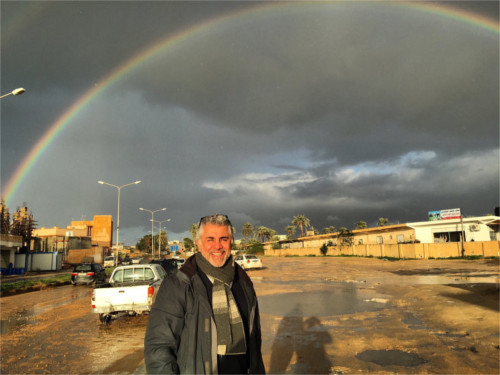 Borzou Daragahi covers the Middle East, including Turkey and Iran, for BuzzFeed News. He formerly served as correspondent for the Financial Times in Cairo and as Baghdad bureau chief for the Los Angeles Times. He is a graduate of the Eugene Lang College of the New School for Social Research and the Columbia University Graduate School of Journalism. Daragahi was a 2005 Pulitzer Prize finalist for his coverage of Iraq and was a part of a Los Angeles Times team that 2007 Pulitzer Prize finalists. He was also named a 2010 Pulitzer Prize finalist for coverage of the election in Iran.
Borzou Daragahi covers the Middle East, including Turkey and Iran, for BuzzFeed News. He formerly served as correspondent for the Financial Times in Cairo and as Baghdad bureau chief for the Los Angeles Times. He is a graduate of the Eugene Lang College of the New School for Social Research and the Columbia University Graduate School of Journalism. Daragahi was a 2005 Pulitzer Prize finalist for his coverage of Iraq and was a part of a Los Angeles Times team that 2007 Pulitzer Prize finalists. He was also named a 2010 Pulitzer Prize finalist for coverage of the election in Iran.
Hometown: I don’t have a hometown. I was born in Tehran but my family quickly left. I grew up in the Chicago area and New York City. I consider myself a New Yorker.
Education: Eugene Lang College of the New School for Social Research and Columbia University Graduate School of Journalism.
Languages you speak: English, fluent but flawed Persian, some German, practical Arabic and Spanish, and minimal French and Turkish.
First job in journalism: A small newspaper in the Boston area.
Countries reported from: Almost every country in the Middle East and North Africa, as well as Afghanistan, Turkey, India, Germany, The Netherlands and Sweden.
Year you joined the OPC: 2017.
How did you become interested in reporting on the Middle East?
As someone of Iranian descent, I have a personal connection to the region. After the events of Sept. 11, 2001, I decided that I would move to the Middle East and attempt to eke it out as a freelancer. It worked out pretty well.
Major challenge as a journalist: Right now, my greatest challenge seems to be obtaining visas and credentials in both a region and a world increasingly hostile to honest journalism. So much of my time now is spent wrestling with officials of various government or private-sector organs who are trying to impede or complicate my efforts to get access to a story. Outside of a few northern European countries, journalists are increasingly seen as a menace to be managed rather than a pillar of democracy and civil society
Best journalism advice received:
For better or worse, I’ve never really had the benefit of a mentor who took me under his or her wing. I seem to have had to learn everything the hard way, making mistakes and learning in a rather improvised fashion. Stanley Meisler, my international journalism professor at Columbia and a veteran of the Los Angeles Times, once advised us to “stay the hell away from photographer and war freaks” in conflict zones. That’s good advice.
Worst experience as a journalist:
At the time, I thought the many weeks I spent literally trapped in the Rixos Hotel in Libya’s capital during the first weeks of the NATO-backed uprising against the regime of Muammer Gaddafi in 2011 were the worst and most frustrating of my career, but in retrospect they were kind of interesting. I think waiting for officials to speak at press conferences is intolerable, especially any kind of press event having to do with the Arab League.
Hardest story: I once did a story about abortion in the Arab world. As a male, that was a particular difficult story to do, and one no one else had really touched before. Serving as Baghdad bureau chief of the Los Angeles Times during the peak of Iraq’s civil war was the hardest job I ever had and likely will have – being responsible for the lives of dozens of people employed by the newspaper.
Journalism heroes: Deborah Amos of NPR and Chris Chivers of The New York Times.
Advice for journalists who want to work overseas: Master a language or a topical niche that you can develop and deepen and use to distinguish yourselves from others. Take language classes, teach English, volunteer for cultural activities. Make it about the work itself and living abroad not just a stepping stone to something bigger and better.
Most common mistake you’ve seen:
The denigration of editing as an art form by most print media is a tragedy. Editors need to love and believe in the written word, and have an ear for language.
Country you most want to return to: Algeria. It has such a rich culture and so much history that has yet to be covered by the English-language press, especially in recent years.
Twitter handle: @borzou
